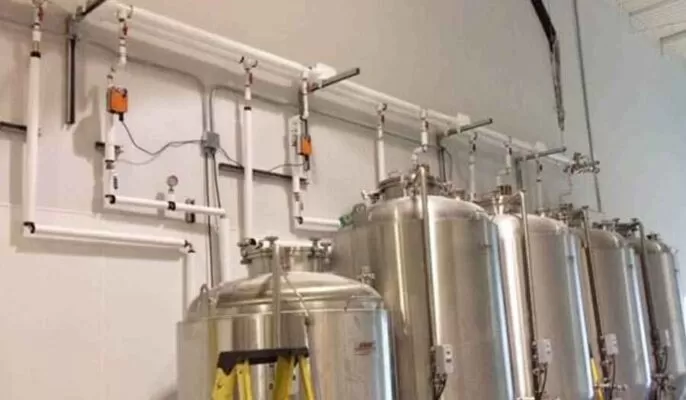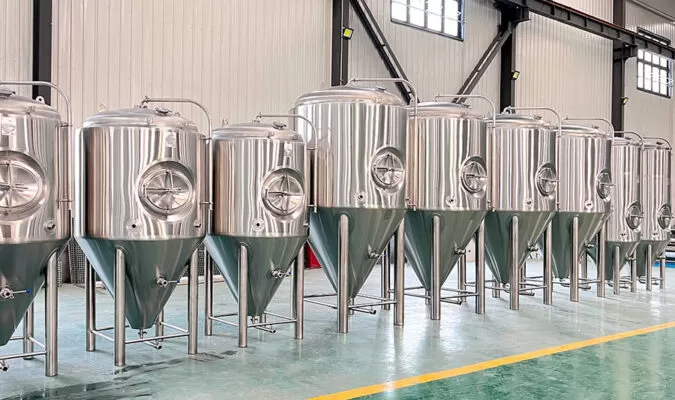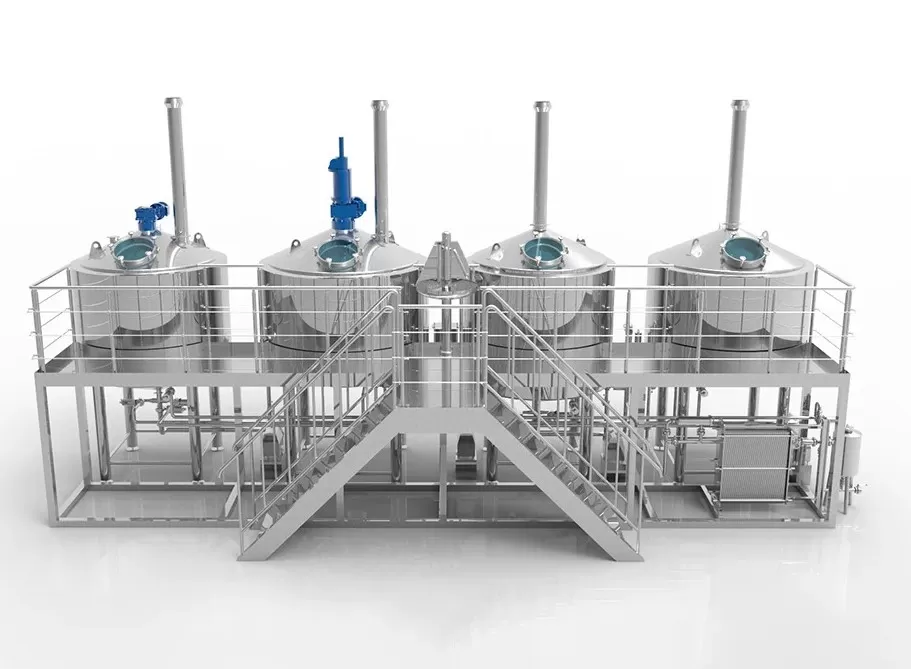Commercial beer brewing equipment encompasses the full range of machinery and systems required to produce beer on a large scale for mass distribution and sale.
Key equipment involved in commercial beer production includes:
- Brewhouse vessels – mash tuns, brew kettles, whirlpools
- Fermentation systems – conical fermenters, aging tanks
- Filtration systems – plate filters, centrifuges
- Packaging equipment – canning, bottling, kegging lines
- Process control and automation
- Material handling – conveyors, pumps
- Steam systems – boilers, heat exchangers, piping
- Cleaning and sanitation systems
- Refrigeration systems – chillers, glycol systems, cooling towers
Commercial beer equipment handles high volumes with automation while maintaining consistent quality and efficiency.
Types of Commercial Beer Brewing Systems
| System | Description |
|---|---|
| Traditional Brewery | Manual brewhouse with basic automation |
| Advanced Brewery | Fully automated brewhouse, fermentation, packaging |
| Mega Brewery | Highly automated, extremely large capacity |
| Craft Brewery | Flexible equipment to produce specialty beers |
| Micro Brewery | Small modular manual or semi-automated systems |
Scale and automation define the main commercial beer equipment categories. Craft breweries focus on specialty beers at smaller volumes.

Key Equipment in Commercial Beer Production
| Process Stage | Equipment Used |
|---|---|
| Milling | Roller mill, hammer mill |
| Mashing | Mash tun, mixer, pumps |
| Lautering | Lauter tun, grant tank |
| Boiling | Brew kettle, whirlpool, heat exchangers |
| Fermentation | Conical fermenters, cooling systems |
| Maturation | Storage tanks, horizontal tanks |
| Filtration | Plate filters, centrifuges, precoat filters |
| Packaging | Bottling, canning, kegging lines |
| Cleaning | CIP systems, tanks, pumps, valves |
| Process Control | PLCs, HMIs, sensors, instrumentation |
The major equipment components work together for end-to-end beer production from raw ingredients to packaged product inventory.
Key Uses of Commercial Brewing Equipment
| Use Cases | Details |
|---|---|
| Beer Production | Brewing all styles of beer – ales, lagers, hybrids |
| Production Flexibility | Frequent product changeovers |
| High Volume Output | Automated systems for mass production |
| New Product Development | Pilot systems for R&D and trials |
| Craft Brewing | Specialty equipment for unique recipes |
| Contract Brewing | Equipment rented out to new brands |
In addition to high volume brewing, the equipment also enables new product development, craft brewing, and contract manufacturing.
Design Standards for Commercial Beer Equipment
| Component | Key Standards |
|---|---|
| Vessels | ASME pressure vessel certification |
| Piping | Sanitary tri-clamp fittings |
| Pumps | Smooth surfaces, clean-in-place |
| Motors | Washdown duty, stainless enclosures |
| Instrumentation | Food/beverage grade sensors |
| Electrical | UL/ETL, NEC, CSA |
| Controls | Stainless panels, IP69k rating |
| Finishes | Interior polish, exterior pickling |
| Cleaning | CIP sprayballs, tanks, pumps |
Stringent hygienic design criteria ensure food safety, maximize uptime, and extend equipment service life in brewery environments.
Specifications of Commercial Beer Production Equipment
| Parameter | Typical Values |
|---|---|
| Brewhouse Size | 5 – 500 hectoliter batches |
| Fermenter Volume | 500 HL – 300,000 HL |
| Packaging Speed | 10,000 – 150,000 cans/hr |
| Boiling Power | 500 kW – 5 MW per kettle |
| Brewing Automation | Manual to fully automated |
| Control System | PLC, touchscreen HMI |
| Power Supply | 208V, 380V, 480V 3-phase |
| Air Requirements | 1.5 – 8 barg supply |
Production capacity, batch sizes, power, and automation levels vary tremendously based on required annual beer output.
Commercial Beer Equipment Manufacturers
| Company | Country |
|---|---|
| Paul Mueller | USA |
| Rolec Prozess | Germany |
| GEA Group | Germany |
| Krones | Germany |
| Alfa Laval | Sweden |
| DME Process Systems | South Africa |
| MiniBrew | Italy |
Leading global manufacturers of specialized commercial beer brewing machinery and complete systems.
Cost of Commercial Beer Brewing Equipment
| System | Typical Cost Range |
|---|---|
| Micro Brewery | $100,000 – $500,000 |
| Pub Brewery | $1 million – $5 million |
| Craft Brewery | $5 million – $15 million |
| Production Brewery | $10 million – $50 million+ |
Equipment cost rises exponentially with production capacity due to need for larger brewhouses, more tanks, and higher automation.
Installation of Commercial Beer Equipment
| Task | Details |
|---|---|
| Site Preparation | Flooring, drainage, utilities, clearances |
| Equipment Unloading | Cranes, rigging, transport |
| Positioning | Per floor plan drawings |
| Utility Connections | Steam, glycol, CO2, compressed air, water, drains |
| Control Wiring | Main control panels, devices, sensors |
| Testing | Component by component dry run checks |
| Commissioning | Full system process trials and optimization |
Careful site planning and thorough integrated testing ensures successful equipment startup and performance.
Commercial Beer Equipment Maintenance
| Activity | Frequency |
|---|---|
| Inspections | Weekly |
| CIP Cycles | Daily |
| Lubrication | Per schedule |
| Gasket Replacement | Annual |
| Calibrations | Annual |
| Drive Maintenance | Per manual |
| Control Upgrades | As needed |
| Major Overhauls | 15-20 years |
Daily cleaning procedures combined with rigorous preventive maintenance maximize longevity of capital-intensive brewing equipment.

Selecting a Commercial Beer Equipment Manufacturer
| Considerations | Guidance |
|---|---|
| Experience | Significant industry expertise ideal |
| Reputation | Proven reliability and project success |
| Offerings | Full systems versus specialized equipment |
| Customization | Ability to tailor to brewery needs |
| Support | Installation help, training, manuals |
| Global Presence | Service available worldwide |
Seeking an established company with extensive brewery experience and customized support services is advised.
Advantages of Commercial Beer Brewing Systems
- High degree of automation and process control
- Fast production with reduced labor requirements
- Ability to brew 24×7 with minimal supervision
- Integrated data collection and analytics
- Hygienic design prolongs equipment lifetime
- Flexibility to brew many beer recipes and styles
- Higher batch-to-batch consistency than manual equipment
- New product development capabilities
- Lower operating cost per volume produced
- Scalability to incrementally increase capacity
Automated commercial brewing equipment offers huge advantages in productivity, flexibility, efficiency and quality over manual operation.
Disadvantages of Commercial Beer Equipment
- Very high capital investment required
- Specialized skillset needed for operation and maintenance
- Significant installation time and complexity
- Training required for brewers and technicians
- Susceptible to downtime from sensor failures
- Regular cleaning and maintenance overhead
- Less handcrafted approach than artisan methods
- Limitations on extremely specialty products
- Complex troubleshooting and repairs
- Long lead times for equipment delivery
The main downsides relate to very high cost and maintenance requirements.
Cost Comparison: New vs Used Commercial Equipment
| Consideration | New Equipment | Used Equipment |
|---|---|---|
| Capital Cost | Very high | 50-80% less than new |
| Customization | Maximum | Limited to existing configuration |
| Life Span | 15-25 years | 5-15 years remaining |
| Reliability | Excellent | May have wear and defects |
| Efficiency | State-of-the-art | May be lower |
| Lead Time | Months | Immediate availability |
Used equipment provides substantial savings but has a shorter remaining life and less flexibility. New systems offer full customization.
Common Problems with Commercial Beer Systems
| Issue | Solution |
|---|---|
| Foaming | Adjust temperature, CO2 levels, check for leaks |
| Cloudy Beer | Increase filtration passes; replace filter media |
| Equipment Jamming | Check product specs; clear blockage; realign |
| Poor Yields | Verify process parameters and controls logic |
| Off-flavors | Review recipes; clean tanks, lines; replace gaskets |
| Alarms | Identify root cause; check sensors, wiring |
An experienced brewmaster along with skilled maintenance staff can address these common brewing issues.
FAQ
Q: What raw materials do commercial brewing systems process?
A: The four basic ingredients are water, malt, hops and yeast. Additional grains, fruit or other adjuncts may also be used.
Q: What degree of automation is typical in modern breweries?
A: Many larger breweries now utilize near complete PLC-based automation for brewhouse, fermentation, packaging and utilities.
Q: How long does it take to produce a batch of beer?
A: Total production time ranges from 5 to 30 days depending on the beer style and parameters. Lagers take longer than ales.
Q: How frequently is cleaning required?
A: Vessels and lines undergo daily automated CIP cleaning cycles between batches. Additional periodic scrubbing also required.
Q: What factors should be considered when selecting equipment?
A: Key factors include production volume, batch frequency, beer varieties, packaging types, floor space, facility services and budget.
Q: How long does installation and commissioning of a brewhouse take?
A: For a large brewhouse system, installation, testing and start up can take 6 months or longer. Smaller systems may require only weeks.
Q: What types of warranty are offered by brewing equipment companies?
A: Warranty periods vary but 1 year comprehensive warranties are common for new equipment installation and commissioning support.
Q: What is the typical lifespan of commercial brewing equipment?
A: With proper maintenance and occasional upgrades, major equipment like tanks and vessels can remain in service for 20+ years.



